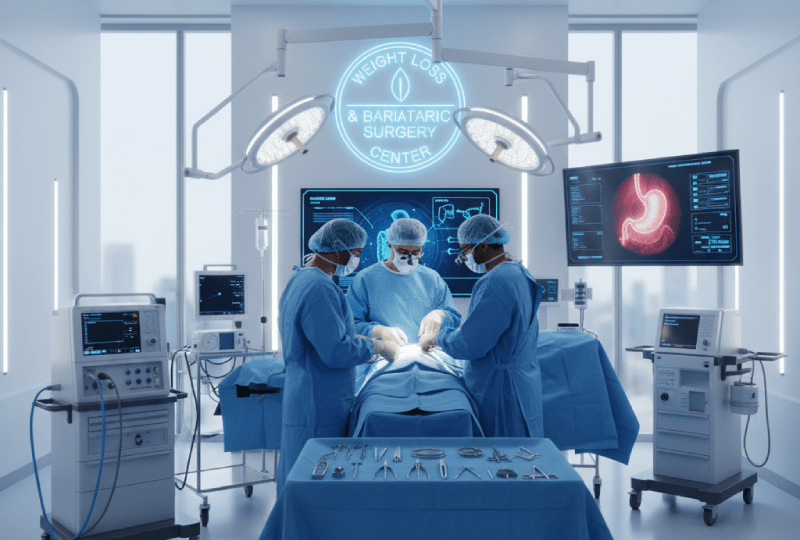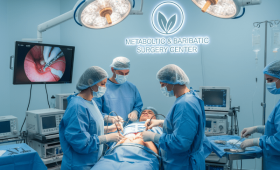Why Are Gastric Bypass Surgery Prices More Affordable in Turkey?
The main reason why Gastric Bypass surgery costs are more affordable in Turkey compared to Western countries is due to several key factors. First, the general cost of living and labor costs in Turkey are lower. This means that hospitals and clinics have lower operational expenses. Furthermore, the difference in exchange rates makes prices much more attractive for foreign patients.
The Turkish government’s incentives and tax policies for health tourism also support this situation. Finally, the experience and competence of surgeons and healthcare staff in Turkey allow for competitive prices without compromising on quality. The combination of these factors offers a high-quality operation at a more accessible price.
What is Included in the Price of Gastric Bypass Surgery?
The prices for Gastric Bypass surgery are usually offered as all-inclusive packages. These packages cover the entire process, both before and after the surgery. Services typically included in these packages are: fees for the surgeon and anesthetist, hospital stay costs (usually 3-5 nights), all necessary pre-operative blood tests and examinations, consumables used during the operation, post-operative follow-up and check-ups, and medications and vitamins provided upon discharge. Some clinics may also add airport transfers and accommodation services to the package. Therefore, it is important to carefully examine the scope of the package when comparing prices.
What is the Quality and Accreditation Status of Hospitals in Turkey?
As a leading country in health tourism, Turkey has modern and well-equipped hospitals. Many private hospitals, especially in major cities like Istanbul, Izmir, Ankara, and Antalya, provide services that meet international standards.
Many of these hospitals are accredited by reputable international organizations such as Joint Commission International (JCI). JCI accreditation indicates that hospitals meet the highest standards for patient safety and service quality. This is a reassuring factor for international patients who may be concerned about the quality of surgeries performed in Turkey.
How Does the Post-Operative Follow-up Process Work in Turkey?
The post-operative follow-up process is one of the most important parts of a successful operation. Patients who have a Gastric Bypass in Turkey are kept under close observation in the hospital for the first few days after the surgery.
After discharge, patients usually stay in the city for a while longer and are checked by their doctors at specific intervals. After returning home, the follow-up process continues online. Dietitians and doctors stay in touch through regular video calls or messaging to help patients adapt to their new nutritional and lifestyle changes.
What is the Process of Traveling to Turkey for the Surgery?
Traveling to Turkey for Gastric Bypass surgery is a very easy and organized process. The first step usually begins with an online consultation; the patient shares their medical history and current condition. After suitability for surgery is approved, the clinic or hospital helps the patient with travel and accommodation planning.
Upon arrival in Turkey, patients are met at the airport and transferred to their accommodation or directly to the hospital. The entire process is pre-planned with the patient’s comfort and safety in mind. This allows patients to focus on the technical aspects of the operation and their recovery.
Which Cities Are Most Preferred for Gastric Bypass Surgery?
The most preferred cities for Gastric Bypass surgery in Turkey are generally Istanbul and Izmir. These cities host numerous hospitals with international accreditation and clinics with the latest technology.
Additionally, access to these cities is very easy thanks to international airports and a developed transportation network. Istanbul stands out with both its cultural richness and extensive health tourism infrastructure. Izmir is also gaining popularity as a center that is both touristically attractive and offers high-quality health services.
How is the Post-Operative Nutrition and Diet Process Managed?
Post-operative nutrition is vital for success. Immediately after the surgery, patients start with a liquid diet, then move on to pureed foods, and finally to solid foods. This process is closely monitored by a dietitian. Patients are taught to eat small, frequent meals, follow a high-protein diet, and take vitamin supplements regularly. Adherence to this new dietary regimen guarantees the long-term success of the surgery.
Is There an Age Limit for Gastric Bypass Surgery?
Generally, the age limit for Gastric Bypass surgery is between 18 and 65. However, factors such as the patient’s general health and the presence of obesity-related comorbidities can extend this limit. For younger patients with serious comorbidities, the surgery may be considered earlier. Similarly, patients over 65 who are in good general health may also be operated on if deemed suitable. The final decision is made by the surgeon and relevant specialists based on a detailed medical evaluation.

Can Patients with High Blood Sugar or High Blood Pressure Have a Gastric Bypass?
Yes, Gastric Bypass surgery is highly effective on comorbidities that arise from obesity, such as diabetes (Type 2) and hypertension. The metabolic changes that occur after the surgery break insulin resistance and regulate blood pressure. Therefore, for patients with diabetes and high blood pressure, Gastric Bypass is a preferred method not only for losing weight but also for controlling or completely improving these chronic diseases.
How Long is the Recovery Period After a Gastric Bypass?
Since Gastric Bypass surgery is performed laparoscopically, the recovery process is usually fast. Patients stay in the hospital for an average of 3-5 days after the surgery. Within the first 1-2 weeks, patients can slowly return to their daily activities. The time for full recovery and return to a normal life varies from patient to patient, but it can generally take 4-6 weeks. During this period, it is recommended to avoid heavy lifting and strenuous exercise.
How Much Weight Can Be Lost After a Gastric Bypass?
With Gastric Bypass surgery, patients typically lose 70% to 80% of their excess weight. Weight loss is very rapid, especially in the first 6 months, and then slows down, entering a plateau period at around 18 months. The amount of weight lost after surgery varies depending on the patient’s starting weight, age, metabolism, and most importantly, their adherence to the nutrition and exercise program. Regular follow-up and discipline are critical to achieving the desired outcome.
Is Hair Loss Experienced After the Surgery?
Yes, after Gastric Bypass surgery, hair loss can be experienced as a reaction of the body to the surgery and rapid weight loss. This condition usually begins 3 to 6 months after the surgery and can last for several months. The hair loss is temporary and stops as the body gets used to the new diet. It is very important to pay attention to sufficient protein and vitamin intake (especially B12, iron, and zinc) to prevent this condition.
What are the Long-Term Success Rates of the Surgery?
Gastric Bypass is one of the most reliable operations with long-term success among bariatric surgery methods. Studies show that this surgery helps more than 90% of patients lose more than half of their excess weight. It also leads to improvement in more than 85% of obesity-related diseases such as diabetes, hypertension, and sleep apnea. Long-term success is directly dependent on the patient’s commitment to lifestyle changes.
Can Weight Be Regained After Gastric Bypass Surgery?
The risk of weight regain after a Gastric Bypass is lower compared to other bariatric surgery methods. However, this risk is not completely eliminated. If eating habits are not monitored and portion sizes increase, the patient can regain weight over time. Weight regain usually begins after the first 2 years. Therefore, adhering to the post-operative nutrition and exercise rules for a lifetime is vital to maintaining the lost weight.
Is Vitamin Supplementation Necessary After the Operation?
Yes, it is mandatory to use vitamin and mineral supplements for life after Gastric Bypass surgery. The surgery reduces nutrient absorption due to the bypassing of a part of the stomach and small intestine. This can lead to deficiencies, especially in Vitamin B12, iron, calcium, and Vitamin D. To prevent these deficiencies and maintain health, patients must regularly use the supplements recommended by their doctors.
How is Post-Operative Pain Management Done?
Since Gastric Bypass surgery is performed laparoscopically, it does not leave a large incision scar, and the level of post-operative pain is generally minimal. Patients are comfortably managed with pain relievers after the surgery. The pain usually decreases within the first few days and completely disappears as patients return to their daily activities. Post-operative pain is not an indication of the success or failure of the surgery and can vary from person to person.
Which Foods and Drinks Should Be Avoided After a Gastric Bypass?
One of the fundamental rules of nutrition after a Gastric Bypass is to avoid sugary and fatty foods. These types of foods can lead to a condition called “Dumping Syndrome” after a gastric bypass. This syndrome manifests with symptoms such as rapid heartbeat, nausea, and sweating. Additionally, carbonated drinks, alcohol, and caffeinated beverages should be avoided, as they can irritate the stomach and cause dehydration.
What are the Eligibility Criteria for a Gastric Bypass in Turkey?
The eligibility criteria for Gastric Bypass surgery in Turkey generally align with international standards. Individuals with a Body Mass Index (BMI) of 40 and above, or those with a BMI of 35-39.9 who have obesity-related comorbidities such as diabetes, hypertension, or sleep apnea, are suitable candidates for this surgery. It is also expected that they are committed to following pre-operative nutrition programs and making lifestyle changes.
What is the Return-to-Work Period After the Operation?
The time it takes to return to work after Gastric Bypass surgery varies depending on the physical demands of the job. Patients working in an office or a job that requires little physical activity can generally return to work 1-2 weeks after the surgery. Those who work in more physically demanding jobs may need to wait 4-6 weeks for full recovery and to return to work.
How Should the Experience of Doctors and the Team in Turkey Be Evaluated?
Surgeons and healthcare teams in Turkey are highly experienced in the field of bariatric surgery. Most surgeons keep their knowledge and skills up-to-date by participating in international conferences and training. Choosing an experienced surgeon is critical for the success of the surgery and minimizing potential complications. Patients are advised to make a decision by examining the doctor’s past experience, success rates, and patient reviews.
Can the Stomach Expand Again After Gastric Bypass Surgery?
In Gastric Bypass surgery, a part of the stomach is not removed, but a small “pouch” is created. It is possible for this small pouch to expand slightly over time. However, this expansion is not large enough to cause significant weight regain. The excessive consumption of high-calorie liquids and soft foods can lead to the pouch’s expansion and weight gain. Therefore, adherence to post-operative nutrition rules is of vital importance.
Does Sagging Skin Occur After the Surgery?
Rapid and significant weight loss after a Gastric Bypass can cause skin sagging in various parts of the body (abdomen, arms, legs). This is a natural consequence of the weight loss process and varies from patient to patient depending on skin elasticity. After the weight loss process is complete, this sagging can be corrected with cosmetic surgeries (e.g., tummy tuck, arm lift). Sports and regular exercise can help to mitigate this condition.
What are the Long-Term Risks After the Surgery?
The long-term risks of a Gastric Bypass include vitamin and mineral deficiencies, Dumping Syndrome, stomach ulcers, and the formation of internal hernias. These risks vary depending on how much the patient adheres to lifestyle changes. Regular medical follow-up and the use of vitamin supplements can significantly reduce these risks. Therefore, it is extremely important to meticulously follow the doctor’s recommendations after the surgery.
Is It Necessary to Use a Health Tourism Agency for Surgery in Turkey?
Using a health tourism agency for Gastric Bypass surgery in Turkey is not mandatory, but it provides great convenience. These agencies organize the entire process on behalf of the patient (hospital selection, doctor’s appointment, accommodation, transfers). They help overcome the language barrier and answer all of the patient’s questions before and after the surgery. These services make the process much smoother for patients coming from abroad.
How Important is Psychological Support After the Surgery?
A Gastric Bypass is not just a physical change but also a major psychological adaptation process. After the surgery, patients have to redefine their eating habits, body image, and social relationships. Getting help from a psychologist or support groups during this process can help maintain motivation, overcome emotional eating problems, and sustain long-term success.
How Can I Access Reviews from Patients Who Had a Gastric Bypass in Turkey?
There are various platforms available to learn about the experiences of patients who had Gastric Bypass surgery in Turkey. Online health tourism forums, social media groups, and patient stories and video interviews on the clinics’ own websites are good resources to get information on this topic. These reviews can help you get a realistic idea about the quality of the hospital and the surgeon.

What are the Possible Side Effects After the Surgery and How to Cope with Them?
Possible side effects after a Gastric Bypass include nausea, vomiting, and fatigue. These are usually temporary and appear in the first few weeks after the surgery. To alleviate these symptoms, patients are advised to eat slowly in small portions and pay attention to their fluid intake. Vomiting can be caused by eating too quickly or too much, so portion control is crucial.
What are the Most Frequently Asked Questions After a Gastric Bypass?
Patients after a Gastric Bypass often ask questions like “When can I eat normally?”, “When can I exercise?”, “Which vitamins should I take?”, and “When will my weight loss stop?”. The answers to all these questions depend on the patient’s individual situation and the post-operative follow-up program. The healthcare team is ready to answer these questions and support the patient throughout this process.
What Should the Body Mass Index (BMI) Be for Gastric Bypass Surgery?
The most common eligibility criterion for Gastric Bypass surgery is for individuals with a BMI of 40 and above. However, patients with a BMI of 35-39.9 who have serious obesity-related health problems (such as diabetes, sleep apnea) can also be considered suitable for this surgery. BMI is not the only determining factor for the surgery; the patient’s general health and motivation are also evaluated.
Are There Special Prices for Foreign Patients for the Surgery?
Most Turkish hospitals and clinics offer special, all-inclusive packages for patients coming from abroad. These packages cover costs such as the surgery itself, hospital accommodation, translation services, and transfers. These special packages enable foreign patients to manage the process more easily and transparently. These prices may differ from the prices available for local patients.
How Often Should Follow-up Appointments Be Made After the Surgery?
Follow-up appointments after Gastric Bypass surgery vary based on the patient’s health status and the doctor’s recommendations. In the first year, face-to-face or online check-ups are usually done at 1, 3, 6, and 12 months. From the second year onwards, check-ups are usually done once a year. During these check-ups, the patient’s weight loss, vitamin levels, and general health are monitored.
Are Pre- and Post-Operative Counseling Services Provided in Turkey?
Yes, many clinics and hospitals in Turkey offer comprehensive counseling services before and after the surgery. In the pre-operative process, consultations are held with a dietitian, psychologist, and surgeon. After the surgery, services like nutritional counseling, psychological support, and exercise planning continue. These services ensure that the patient is prepared for the process both physically and psychologically.
Can Caffeine Be Consumed After Gastric Bypass Surgery?
It is generally recommended to avoid caffeinated beverages in the first few months after surgery. Caffeine can irritate the stomach and cause dehydration. Additionally, caffeinated drinks often contain sugar, which can increase the risk of Dumping Syndrome. After a few months, with the doctor’s approval, a limited amount of caffeine can be consumed, but this decision should always be made under medical supervision.
How is Alcohol Consumption Affected After a Gastric Bypass?
Alcohol consumption should be strictly limited after a Gastric Bypass. The surgery accelerates the absorption of alcohol, which leads to quicker intoxication and the risk of alcohol poisoning. There are also risks such as the high-calorie content of alcohol and its potential to cause ulcers in the stomach pouch. Therefore, it is advisable to avoid alcohol consumption after the surgery or to consume it very rarely and in small amounts.
In Which Situations is Gastric Bypass Surgery Not Preferred?
Gastric Bypass may not be recommended in some situations. It is not a suitable option for patients with alcohol or substance addiction, uncontrolled psychiatric disorders, or patients who do not understand the risks of the surgery. Also, it is generally not recommended for individuals with a BMI below 30 who do not have comorbidities related to obesity. In such cases, psychological support or less invasive methods should be considered first.


